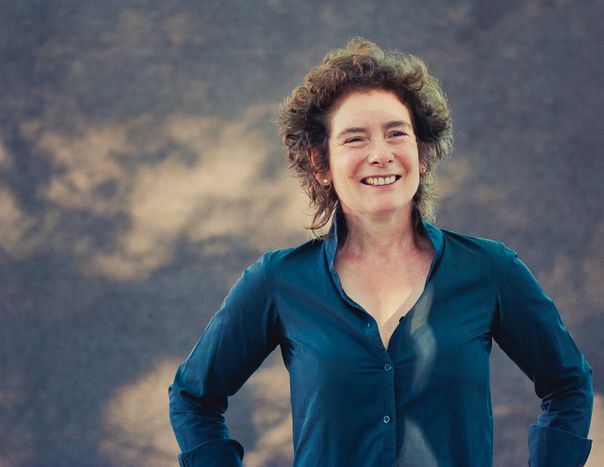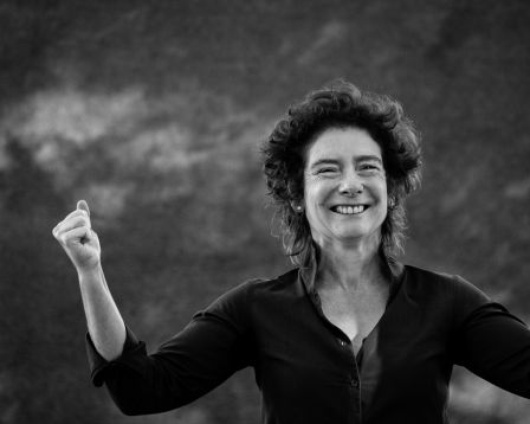
Jeanette Winterson at Edinburgh book festival: rehearsing the apocalypse
Published on
Jeanette Winterson enters the book festival tent at a run, bounding onto the stage. Introduced by journalist Kirsty Wark with f-words – feisty, fun and feminist – the post-modernist author is at the Edinburgh book festival to read from her recently published autobiography, Why be happy when you could be normal?
‘Can I get a show of hands to see who's never read anything by Jeanette Winterson,’ asks the author at the start of her reading. About a quarter of those seated in the three hundred strong audience put their hands up. Oh that’s marvellous,’ smiles 53 year old Winterson, in a tone not dissimilar to that of a headmistress offering her pupils a treat. ‘You all knew that something was missing from your lives and although you didn’t know what, you went online and booked tickets for this event. I can’t promise you a pot plant, which is what Mrs Winterson got when she found Jesus.’ There is smug laughter from the knowing and bemused laughter from the uninitiated. (Mrs Winterson was Jeanette’s adoptive, Pentecostal mother.) ‘However, I do hope that when I ask you at the end you can all put up your hands and say that you’ve been saved.’
 Saviour or otherwise, Winterson is a stellar performer. One of the few writers appearing at the festival without an interviewer or chair, she reads dynamically for about half an hour, occasionally interrupting herself to remark, ‘That bit’s good, isn’t it? I thought of that myself’. After the first extract, she takes a sip of water before saying half-jokingly, ‘Makes you want to buy the book, doesn’t it? It’s good value for money.’
Saviour or otherwise, Winterson is a stellar performer. One of the few writers appearing at the festival without an interviewer or chair, she reads dynamically for about half an hour, occasionally interrupting herself to remark, ‘That bit’s good, isn’t it? I thought of that myself’. After the first extract, she takes a sip of water before saying half-jokingly, ‘Makes you want to buy the book, doesn’t it? It’s good value for money.’
Winterson has criticised the UK’s most prestigious literary award, the man booker prize, for rewarding readability rather than literature. She argues that there is a simple test of the latter: does this writer’s capacity for language expand my capacity for feeling? This conception of literature is explained in her autobiography. Other than the bible and her mother’s murder mysteries, books were forbidden in the Winterson household. However, the forbidden fruit offered Jeanette an escape route, eventually taking her to Oxford university. ‘The way that my mother talked about books, it was clear they were potent,’ explains Winterson. ‘I knew that was what I needed. What annoys me about education now is that it all has to be socially relevant.’ We should be giving our children Jane Eyre, George Eliot and Dickens to read, she argues. ‘We should give our kids the best. Tell them if it’s difficult. That’s not a four letter word. If we are all going to drop dead at the end of this life, we want the best.’
This wanting the best is characteristic for Winterson. ‘I think it’s a good rule in life to always risk it, especially for writers.’ You have to be aware that things won’t improve straight away, she states. ‘That’s why writers often lie down in bed to write – because we’re in such an uncomfortable place in our heads.’
'God is religion-proof'
‘Why be happy when you could be normal’ retells a narrative which readers might think they know from Winterson’s debut novel and fictional autobiography ‘Oranges are not the only fruit’. Remarkably, Winterson is now able to describe her unusual and traumatic childhood, the material of both books, with humour. ‘We used to rehearse the apocalypse,’ she tells the audience. ‘Other people have fire drills, we had the apocalypse. It gives you a different approach.’
This approach might be expected to put anyone off religion for life: as a teenager, Winterson was exorcised for lesbianism. Nonetheless the whitbread prize winner has an open attitude to religion. ‘I think God is religion-proof,’ she muses, adding, ‘which is fortunate. I’m disappointed in the church and organised religion but spirituality runs right through me. It’s in the way I talk, the way I think. Breaking with that would be false. If that part of me has to stay, then it should be in a way that allows me to live better. It doesn’t matter whether it’s all a myth. Having a sense of something larger isn’t comforting, as some people claim, but challenging. It’s helpful.’
With surprising frankness for our increasingly secular society, she admits, ‘If someone asked me whether I thought there was a life after this one, I’d have to say yes. Life is all about efficiency. I just don’t see why we’d bother going to such lengths only to die.’ She chuckles. ‘My partner is non-believing and I always joke that in the split second after the two of us die, one of us is going to say, ‘Oh shit.’’
Jeanette Winterson read at the Edinburgh international book festival on Monday 20 August 2012. Images: © Trevor Fountain



